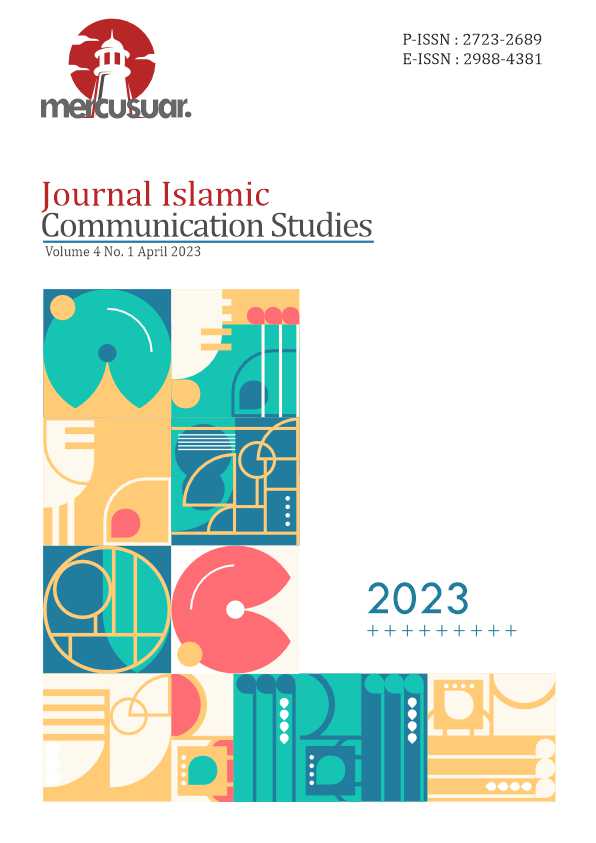The Islamic Preaching Management of KH. Lanre Said at the Darul Huffadh Islamic Boarding School in Tuju-tuju, Kajuara Subdistrict, Bone Regency
Abstract
Based on the research problem, this study aims to demonstrate the dakwah (preaching) management of KH. Lanre Said at Pondok Pesantren Darul Huffadh Tuju-tuju, Kajuara Sub-district, Bone Regency.
This research employs a qualitative descriptive approach and is conducted at Pondok Pesantren Darul Huffadh Tuju-tuju, Kajuara Sub-district, Bone Regency. The research utilizes both dakwah and communication science approaches. The primary data sources include the head of the pesantren, the director of Pondok Pesantren Darul Huffadh, and additional informants, namely Ustadz Safaruddin, Ustadzah Sa'Diah Said, Ustadz Ainurrofiq, Ustadz Nasrul Haq, Ustadz Amirul Mujahidin, Ustadz Ahmad Muharrar, and Ustadz Abd Wahid. Secondary data sources consist of books, internet resources, e-books, journals, and other supplementary data. Data collection methods involve observation, interviews, and documentation. Data analysis is carried out through three stages: data reduction, data presentation, and drawing conclusions.
The results of the study indicate that the dakwah planning carried out by KH. Lanre Said at Pondok Pesantren Darul Huffadh Tuju-Tuju Kajuara has been well-implemented and yielded positive impacts. Through a structured management approach, involving all components of the pesantren and optimizing available resources, the pesantren successfully produces young generations who have memorized the Quran and practice its teachings in their daily lives. The dakwah planning process involves various activities, such as daily Quranic memorization (tahfidz) under the direct supervision of a mentoring team, as well as muhadharah activities to train public speaking skills, deliver lectures, and present sermons in three different languages. The results of this dakwah planning demonstrate that the students of Pondok Pesantren Darul Huffadh Tuju-Tuju Kajuara are capable of effectively preaching and have successfully inspired the surrounding community. This success emphasizes the importance of mature, structured, and continuous dakwah planning to achieve dakwah goals and develop generations with profound religious understanding and active engagement in society. Thus, this research concludes that the dakwah planning conducted by KH. Lanre Said at Pondok Pesantren Darul Huffadh Tuju-Tuju Kajuara, Bone Regency, has yielded significant results, and this planning model can serve as an example and inspiration for other Islamic preaching and educational institutions.
The implications of this research are that, after conducting the study at Pondok Pesantren Darul Huffadh, the implementation of dakwah management activities should be conducted more proactively by the leaders and mentors of the students, particularly in carrying out tahfidz activities, muhadharah activities, and gratitude activities to instill discipline in learning and memorization to achieve specific goals.
Downloads
References
Muhammad Munir, Wahyu Ilaihi, Manajemen Dakwah, (Jakarta: Kencana Prenada Media Group, 2012).
Branta, Dasar-dasar Manajemen, (Bandung: Alfabeta,2009).
Rizqia Salma Noorfaizah, “Manajemen pembelajaran Tahfidzul Quran Berbasis Metode Yaddain di mi Plus Darul Huffadz Sumedang” Nidhomul Haq, Vol. 4. No. 2, 2019.
Ahmad Atabik, Management Dakwah Perspektif Al-Qur’an, Jurnal Tadbir, Vol. 1, No. 1, 2016.
Departemen Agama RI, Petunjuk Teknis Pondok Pesantren, (Jakarta: 2004).
Ahmad Muhakamurrohman, Pesantren: Santri, Kiai, dan Tradisi, Ibda Jurnal Kebudayaan Islam, Vol. 12, No. 2.
Mardiyah, Kepemimpinan Kiai dalam Memelihara Budaya Organisasi di Pondok Modern Gontor, Lirboyo Kediri, dan Pesantren Tebuireng Jombang, Jurnal Tsaqafah, Vol. 8, N0. 1, 2012.
Fitriyani, Ema Dwi, Model Pembelajaran pesantren dalam Membina Moralitas Santri di Pondok Pesantren Sabilul Hasanan Banyuasin, Jurnal PAI Raden Fatah, Vo. 2, No. 1, 2020.
Syarifah, Manajemen Kurikulum Kulliyatul Mu’allimin Al-Islamiyah di Pondok Modern Darussalam Gontor, Jurnal At-Ta’dib, vol. 11, No. 1, 2016.
Ahmad Sarbini, Paradigma Baru (Pemikiran Dakwah Islam 2008).
Kementerian Agama RI, Alquran dan Terjemahannya, (Jakarta: Direktorat Jenderal Kantor Urusan Agama Islam Pembinaan Masyarakat Islam, 2012).
Kementerian Agama RI, Alquran dan Terjemahannya, (Jakarta: Direktorat Jenderal Kantor Urusan Agama Islam Pembinaan Masyarakat Islam, 2012).
Noeng Muhajir, Metode Penelitian Kualitatif Cet. VIII; Yogyakarta: Rae Sarasin, 1996.
Asep Saeful Muhtadi dan Maman Abd. Djaliel, Metode Penelitian Dakwah Cet. I; Bandung: Pustaka Setia, 2003.
Yunan Yusuf, Manajemen Sebagai Problematika Dakwah.


